Republican Bill Protects Right to Garden
Prevents local ordinances prohibiting someone from growing food on their property.
Wisconsinites’ ability to spend summers enjoying homegrown herbs, fruits and vegetables could be codified into law under legislation proposed earlier this month by two Republican lawmakers.
The Wisconsin Vegetable Garden Protection Act, co-authored by Sen. André Jacque (R-DePere) and Rep. Shae Sortwell (R-Two Rivers), would prevent local governments from passing or enforcing ordinances that require a permit for or prohibit someone from growing food on their own property.
The draft bill is based on model legislation from the Institute for Justice, a libertarian advocacy organization that focuses on issues such as school choice, private property and loosening economic restrictions. The organization has previously worked in Wisconsin, fighting lawsuits against state laws restricting people’s ability to sell homemade baked and canned goods.
Similar vegetable garden laws have already been enacted in Florida and Illinois.
“Growing our own food should be a basic human right,” the bill’s co-sponsorship memo states. “However, heavy-handed regulators have used local zoning ordinances to explicitly ban home vegetable gardens, or to put up unreasonable rules governing what homeowners may grow, and where they can plant their food, with heavy fines levied for violating these mandates. State law should encourage and protect, not limit, home vegetable gardens.”
Jacque told the Examiner that the idea for the legislation came from a constituent, Zara Scharf, who was searching for ways to protect her garden.
“I love my garden. I’ve invested a substantial amount of work and money into it,” Scharf says. “In an effort to protect my native and edible plantings, I sought out model municipal code for rules protecting food gardens. In my search, I came across model legislation called The Vegetable Garden Protection Act from The Institute for Justice. I sent the model legislation to Andre Jacques and other legislators. This was more than what I had originally asked for. I am seeing more fireflies, monarchs, and busy bumblebees in my garden than ever before and plan to peacefully enjoy my garden for many years to come.”
The draft legislation includes provisions that give local governments the ability to regulate the height and location of vegetable gardens as well as the use of water or fertilizer and control “noxious weeds” or invasive species.
“It leaves the door open for a local government to pass necessary health and safety regulations,” Institute for Justice staff attorney Ari Bargil says. “Governments can pass a law saying it can’t be over a certain height, can’t be within a certain distance to the road or sidewalk. But it can’t expressly prohibit vegetable gardens.”
The lawmakers and an attorney for the Institute for Justice say the bill is about food security and protecting the basic human right to grow your own food.
“Recent events, including the global pandemic which has stressed global supply chains, emptied grocery store shelves, and increased food prices, makes protecting this basic human right a necessity for many today,” the co-sponsorship memo states. “This proposal, based on model legislation from the Institute for Justice, will protect the right of Wisconsin homeowners to grow their own food on their own property, free from unreasonable restrictions.”
Bargil says restricting home gardens is “un-American.”
“Growing food on your own property is something human beings have been doing since time immemorial, and to the extent local governments want to stop people from growing food for themselves, those restrictions impair liberty and impair a time honored American tradition,” Bargil says. “Generally speaking these prohibitions are backed by the subjective aesthetic preferences of those who pass these regulations. There are people who think that looking at another person’s vegetable garden is offensive or unsightly. I think that’s classist and un-American, yet it happens.”
It’s unclear how many municipalities around the state have ordinances prohibiting vegetable gardens. Earlier this year, the city council of Two Rivers, which is in both of the bill authors’ districts, updated the city’s municipal code to create a pilot program allowing vegetable gardens in front yards.
Prior to 2016, the local code had prohibited vegetable gardens entirely. Despite that ordinance, many residents kept their own gardens, which led local officials to update the code, allowing for gardens to be grown in back and side yards as long as they’re at least three feet from the property line. Front yard gardens remained prohibited under the 2016 change, but existing front yard gardens were grandfathered in and allowed to remain.
Meanwhile other municipalities have relatively lax rules about homegrown food. In March, the Madison Common Council amended the city’s chicken ordinance, doubling the amount of chickens a household can have in a backyard from four to eight. Homeowners are required to obtain a $10 permit before the chickens are allowed. Several of the state’s largest cities, including Appleton, Green Bay, Kenosha and Milwaukee, allow backyard chickens.
The deadline for lawmakers to sign on as co-sponsors of the vegetable garden bill is July 26.
Legislative Republicans introduce bill protecting right to garden was originally published by the Wisconsin Examiner.






















